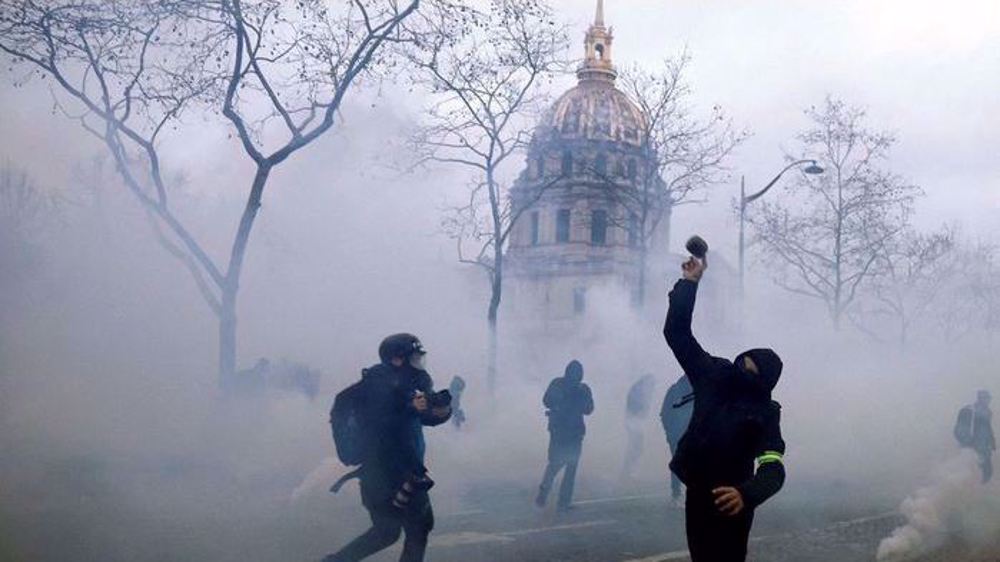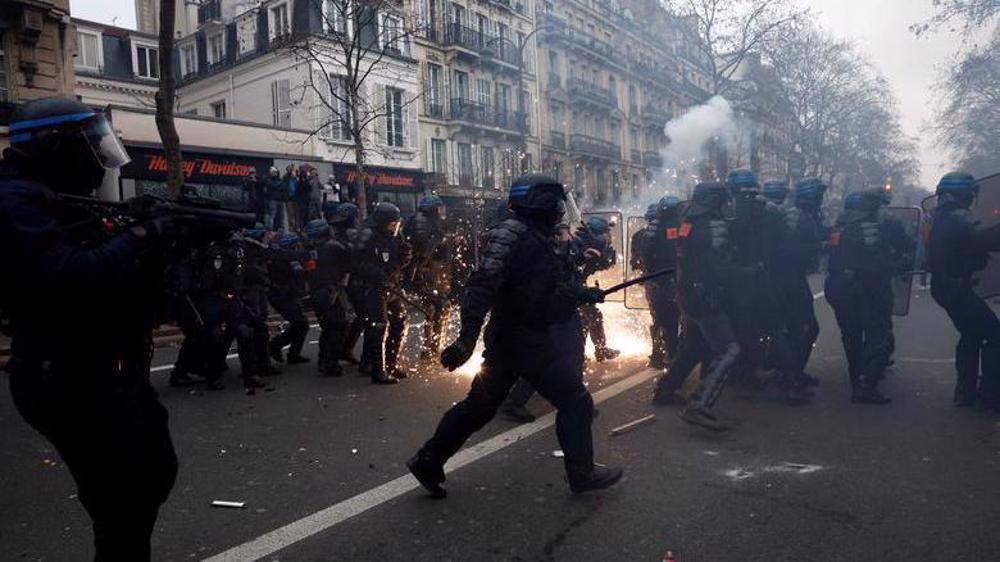French protesters demand government abandons pension reforms
French labor unions have organized and staged a fifth wave of protests and walkouts against the government’s proposed pension reform plans.
Protesters took to the streets on Thursday in a number of cities nationwide, seeking to keep up pressure on the government over the proposed plans.
However, there were fewer disruptions during the protests compared to previous ones with the Paris Metro and most mainline train services working normally and most schools unaffected. Almost a third of flights were canceled at Paris’ second busiest airport, Orly.
The CGT union, one of eight backing the protest, put the number of protesters at about half as many as last Saturday's rally in which an estimated 2.5 million people participated.
“These reforms are robbing people of their rights. I’m here today to show (President) Macron that he cannot be deaf and that there are consequences when you try to defy the majority of the country,” said Pierre-Yves Toudic, a 34-year-old engineer who was protesting at the Bastille Plaza in central Paris.
“The current pension system is not equitable, not fair. Some people can receive a pension of more than 10,000 euros ($10,706) per month for example,” said 34-year-old economics professor Clemence Lonchal.
The reform bill proposed to increase the minimum retirement age from 62 to 64. French President Emmanuel Macron insists that the proposed government plan is vital to ensuring the viability of the country's pension system.
Pushing back the retirement age by two years and extending the pay-in period would yield an additional 17.7 billion euros ($19.18 billion) in annual pension contributions, allowing the system to break even by 2027, according to Labor Ministry estimates.
Unions say there are other ways to do this, such as taxing the super-rich or asking employers or well-off pensioners to contribute more.
French union leaders have called on the government to abandon the plan, threatening to bring the country to its knees from early March if their demands are not met.
CGT head Philippe Martinez said the strategy was to “keep up pressure on lawmakers” to reject the bill. The union this week called on waste collectors to join the protest, which could see refuse and recyclables piling up on French streets.
In the meantime, French lawmakers in the parliament are currently working on the pension bill with the opposition suggesting amendments to the plan before the Friday deadline. Nearly 11.000 amendments remain to be examined by Friday midnight. The pension bill, whether or not it has been fully reviewed by the lower house lawmakers, will then automatically go to the Senate for consideration.
In the past, heavy-handed tactics carried out by French security forces, such as crackdown, use of violence, heavy fines, arrests and imprisonment succeeded in stifling mass protests across the country.
Mass protests by the Yellow Vests, staged before and during the global outset of the novel coronavirus slowly dwindled in scale and magnitude, owing to the COVID-19 restrictions.
Since then, the French have been reduced from the most politically-active nation in the West to being apathetic towards the country's politics.
The apathy of the French people surrounding this year’s re-election of Macron in France was considered completely atypical of the nation.
However, the Yellow Vest movement did commemorate its fourth anniversary in December and loyalists, supporters and sympathizers to the anti-government movement voiced their preparedness for action and mobilization when the time comes.

US, France want mercenaries deployed in south Lebanon: Report

French immigration language test sets applicants for failure: Report

NATO faces 'moment of truth' on future of military alliance: France
US special envoy in Kiev amid war of words between Trump, Zelensky
Hamas says ready to free all Israeli captives at once in phase two of truce
Israel kills one, injures two in southern Lebanon: Media
‘Colonial powers’ have no right to determine fate of Palestine: Qalibaf
Explainer: Why are MK-84 2,000-lb bombs approved by Trump for Israel so deadly?
President Pezeshkian: Iran, Qatar opening new avenues for cooperation
VIDEO | Displaced return home despite destruction
IRGC unveils new homegrown smart missiles, drones drill











 This makes it easy to access the Press TV website
This makes it easy to access the Press TV website